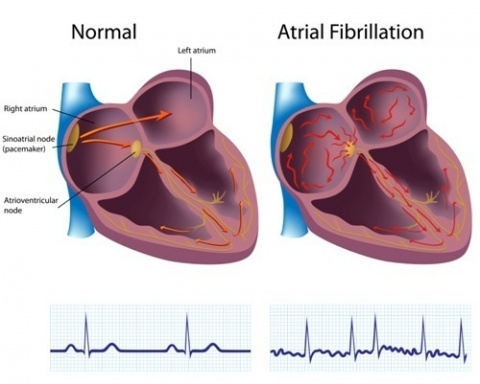Article • Patient care
Cardiac records highlight an enigma
Two new studies have focused on the impact of weekend care and discharge on heart patients within the NHS in England. In one, patients suffering atrial fibrillation (AF) who were admitted to a National Health Service (NHS) hospital over the weekend faced a higher risk of dying within five years than patients admitted during normal hours.
Report: Mark Nicholls

In a second study, researchers found that HF patients discharged from hospitals in some parts of England at weekends were at an increased risk of dying than those sent home during regular weekday hours.
The new AF research on patients was led by Dr Rahul Potluri, founder of the Algorithm for Comorbidities, Associations, Length of Stay and Mortality (ACALM) study unit at Aston University’s Medical School, in Birmingham, and focusing on 42,687 patients with one of the most common forms of abnormal heart rhythm.
The study found that atrial fibrillation patients admitted outside normal operating hours (9am-5pm, Monday-Friday) had a ten percent increased risk of dying within the next five years. The research was adjusted to account for external factors that could influence death rates, such as age, gender, ethnic group, and the most common causes of mortality in the UK.
It is believed that AF affects about a million people in the UK, though many more may be undiagnosed and are unaware that they have the condition. In a separate study, the researchers looked at 31,760 atrial fibrillation patients discharged from hospitals in the north of England at weekends, finding a thirty-two percent increased chance of dying over the next five years compared to those sent home during regular weekday hours.
Across the UK there are more than 500,000 people diagnosed with HF. ‘This study shows that the weekend effect is very much a reality for those suffering two of the most prevalent heart conditions in the UK,’ Potluri pointed out. ‘These patients are, quite simply, more likely to die if admitted or discharged outside regular hours, and that trend is particularly noticeable at the weekend.’

The researchers said they were not in a position to comment on the underlying reasons for this from their study but did say it suggested that the level of support provided at weekends, from all teams involved in healthcare – in the hospital and in the community - should be addressed.
‘What this research shows is that the weekend effect is not a universal phenomenon,’ Potluri added. ‘Across the two conditions we studied, its impact was varied, suggesting it can’t be tackled effectively by blanket improvements to care. ‘Our findings suggest that the weekend effect is very complex and further research is urgently needed to assess what the implications of the weekend effect are for individual conditions, before any costly changes to services are implemented.’
Profile:
Rahul Potluri PhD is founder of the ACALM (Algorithm for Comorbidities, Associations, Length of stay and Mortality) study unit at Aston University in Birmingham. His clinical epidemiology research identified a link between high cholesterol and breast cancer and other prominent studies include health service research evaluating differences in death rates from weekend admission and discharge from UK hospitals, ethnic variations and the interplay between cardiovascular disease and mental health.
* The research involved the records of 929,552 patients (42,687 admitted with atrial fibrillation and 31,760 discharged following heart failure) between the first of January 2000 and 31 March 2013 across a number of North of England hospitals. Data was analysed according to the ACALM study protocol.
25.08.2016











